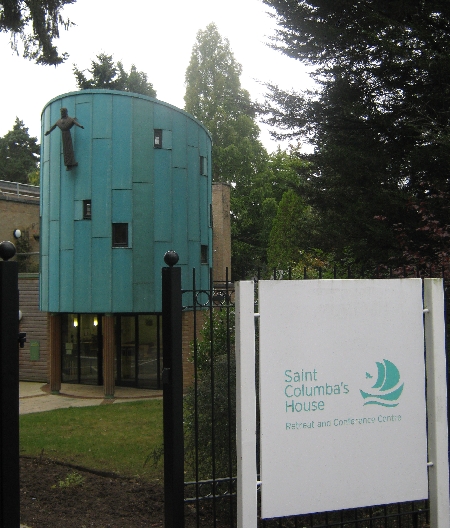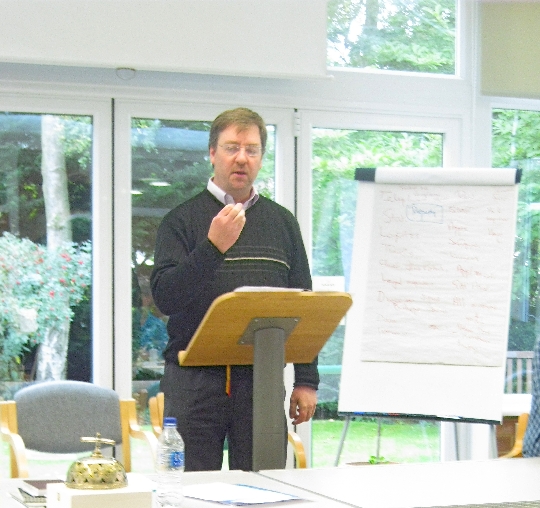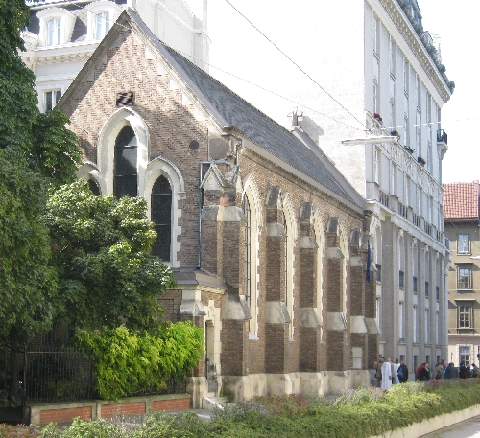
As I wrote in my previous post, rather than being hosted by one of the Chaplaincies within the Eastern Archdeaconry, our 2013 Synod meeting, took place at St. Columba’s House, a Conference and Retreat Centre in Woking, Surrey, England, between Thursday 19th – Sunday 22nd September. Here is the post about the Synod meeting itself, as promised at the end of my previous rant about the profusion of unnecessary notices.
From my point of view, having the Synod meeting at Woking did mean it was relatively easy to travel to. I flew Prague – London Gatwick and return, using that well-known low cost airline one of my Church Council members has christened ‘SqueezyJet’, leaving Prague at lunchtime on Thursday and arriving back home in the middle of Sunday evening. The flights both ways, departed right on time, and the onward train journey from Gatwick to Woking, was relatively quick and simple.
As I frequently explain, the Diocese in Europe, of which the Eastern Archdeaconry is part, is the forty-fourth diocese of the Church of England, but no part of it is in England! Strictly speaking, that statement is not quite true as the Diocesan Office is in London and the Bishop’s residence and office, is at Worth, near Crawley, ten minutes drive from London Gatwick Airport. Therefore, the idea of holding our Synod meeting in Woking was so that we might meet with and hear from members of the Diocesan and Bishop’s staff, who are normally only names on the end of emails.
During our Synod meeting, we heard from our soon to retire Diocesan Bishop, Rt Rev’d Dr Geoffrey Rowell, who sought to answer the question, ‘What is a Diocese and what is its purpose?’ Other speakers were the Chair of the Diocesan Board of Finance (DBF), the Diocesan Appointments Secretary, the Diocesan Director of Ordinands (DDO), and the Diocesan Communications Officer. The last of these is also a member of the Diocesan Safeguarding Committee so he also spoke about the very important issue of the safeguarding of children & vulnerable adults.
The Chair of the DBF, obviously spoke about the finances of the diocese – where the money comes from, (mainly the annual contributions of each of the Chaplaincies, together with the income from historic grants and investments), and what it is spent on. The Appointments Secretary spoke about all the procedures involved in appointing a new Chaplain, when there is a vacancy. This was of great help to lay members of the Synod who may face this situation in the near future; for example St Andrew’s, Moscow, where Canon Simon Stephens is due to retire in June next year.
Following the talk by the Diocesan Appointments Secretary, there was quite an interesting discussion around the issue of the legal status of the Anglican Church in each of the over forty countries across which our diocese is spread, and regarding complying with employment law within each of them. This is becoming an ever increasing problem for several Chaplaincies within the Eastern Archdeaconry. Much of this arises out of the historical origin of many of our Chaplaincies.
Particularly in capital cities, many European Anglican Chaplaincies were established with the support of the British government, in conjunction and with the British Embassy in each country. This is reflected in the geographical location of several of them. For example, Christ Church, Vienna is directly opposite the British Embassy in the Austrian capital. St. Nicholas, Ankara, is within the grounds of the British Embassy in the Turkish capital. In the past, Chaplains were often deemed to be Chaplain to the Ambassador and thus had diplomatic status. Despite the Church of England still officially being the Established Church in England, (though not in Wales, Scotland or Northern Ireland), these days there is an ever-increasing distance between Church and state.
At one level, I’m very pleased that there is this distancing as many people still think that somehow we are the spiritual arm of the Foreign and Commonwealth Office and financed by the British government. Just to be clear, we are not! But this change has also created problems. For example, the Athens Chaplaincy, despite being in existence since the middle of the nineteenth century, recently had its bank account frozen because it was deemed not to be a legal entity and was therefore accused of tax fraud! Their problem is in the process of being resolved, but not without a few difficulties on the way.
As well as our speakers, the Synod meeting also provided various opportunities for corporate worship in the Conference Centre Chapel, led by ordained members of the Synod and by licensed Readers. Both Jack Noonan and I, led services of Morning Prayer. We also enjoyed two Bible Studies led by Canon Meurig Williams, Chaplain to our Diocesan Bishop and currently also Acting Archdeacon of NW Europe.

As I have written several times previously, one of the most valuable parts of our annual Archdeaconry Synod meetings, is the opportunity for fellowship and mutual support for those of us who work in very isolated situations. In many respects, it is an annual meeting of old friends as well as meeting one or two new ones too.
Finally, in 2014, I will not need to travel at all to attend the meeting of the Eastern Archdeaconry Synod as the Prague Chaplaincy have agreed to be the hosts. Between now and Thursday 25th September 2014, I and my Prague Church Council, have a lot of planning and organising to do. As I often write – watch this space!




How nice to see a photo of Meurig. 🙂 I always enjoyed this kind of meeting with its opportunities to worship together and share experiences as well as acquiring useful information. What fun to have the Synod meeting in Prague next year. They’ll have a great time. 🙂
Thank you Perpetua – I thought that you in particular, might enjoy the second photo. It will be fun to host the Archdeaconry Synod meeting in Prague next year but they’ll be a lot of hard work over the next twelve months in order for it to run smoothly & successfully.